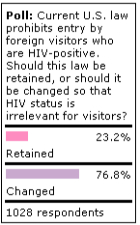Poll: Should the U.S. Welcome People with HIV? [January 2008]
Poll Question: Current U.S. law prohibits entry by foreign visitors who are HIV-positive. Should this law be retained, or should it be changed so that HIV status is irrelevant for visitors?
Background
During the Reagan administration, HIV was added to a list of diseases that disqualify foreigners from entering the U.S. or establishing legal permanent residency here. Along Poll-Immigration-results
Closing results of poll as of March 12, 2008 with active tuberculosis, syphilis, and a handful of other diseases, HIV/AIDS became a criterion by which U.S. immigration officials could exclude potential immigrants or deport non-citizens already living here.

Poll ended March 2008. |
The HIV immigration prohibition in the U.S. reflected the public’s intense fear of HIV and AIDS during the mid-‘80s. Supporters of the law say it is needed to limit the spread of HIV in this country and stress concerns that HIV-positive immigrants would drain money and other resources from the U.S. healthcare system, essentially forcing taxpayers to subsidize their AIDS treatment.
Opponents of the federal ban argue that it stigmatizes people with HIV unfairly, and that because the virus is not spread through casual contact, there is no persuasive public health rationale for banning HIV-positive immigrants. They also point out that the law already requires immigrants seeking permanent resident status to prove that they are economically self-sufficient, and that immigrants with other diseases, such as cancer, are not automatically barred.
CURRENT STATUS
The U.S. is now one of only 13 countries that maintain a legal ban on HIV-positive immigrants, the others being Armenia, Brunei, China (which has announced plans to reform their policy), Iraq, Libya, Moldova, Oman, Qatar, the Russian Federation, Saudi Arabia, South Korea, and Sudan.
On World AIDS Day 2006, President George W. Bush expressed his intent to relax the current U.S. travel ban through the creation of a categorical waiver that would enable HIV-positive people to enter the country for short visits. By December 2007, the Department of Homeland Security (DHS) had released a proposed regulation to streamline the waiver application process for HIV-positive travelers wishing to visit the U.S. for 30 days or less. This would allow a determination on an application to be made at the consular officer level in home countries, rather than by the DHS.
The U.S. move would not amend or remove the HIV inadmissibility clause in the Immigration and Nationality Act (INA) and would not affect HIV-positive persons wishing to emigrate to the U.S., or those who wish to enter the country for long-term employment or study. The bill, the HIV Nondiscrimination in Travel and Immigration Act of 2007 (S. 2486), would also require a review of HIV as a communicable disease of public health significance within the INA.